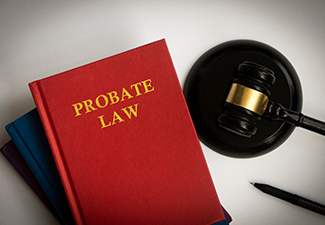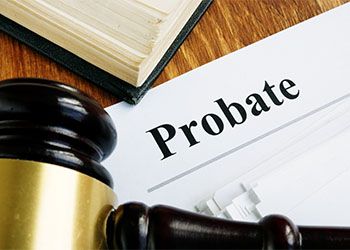I’ve Been Appointed Executor. Now What?
So, you've been appointed as the executor for a late loved one's estate. It's a big responsibility during an already heavy time. Hopefully, if you're researching what to do, you've found time to grieve before diving into the legal and financial work of handling someone else's assets. But, as you're likely well aware, grief tends to come and go in waves. So, while you're working through that process and preparing to tie up the financial loose ends for your loved one, remember that you don't have to do it alone.
When you're ready to begin the process of administering an estate, I hope you refer back to this guide. We'll go through the basic steps of what an executor typically does and how to handle them.

Defining Executor, Administrator
What does being an executor really mean? In simple terms, an executor is the person appointed to carry out the instructions in a will. The executor is responsible for managing and distributing the assets of the deceased according to their wishes. This includes paying any outstanding debts, filing necessary tax returns, and distributing property to beneficiaries. In the case where there is no will, this person is referred to as the Administrator and distributes the property according to the law of "intestate succession".
In most cases, an executor is named in a will by the deceased person. If there is no named executor or if the named executor is unable or unwilling to fulfill their duties, then a court may appoint an executor. Both an Executor or and Administrator are often referred to as being the "personal representative" of the estate.
What if I Don't Want to Be an Executor?
It's understandable if the thought of being an executor/administrator causes you stress or anxiety. It can be a lot of work and responsibility, especially during a difficult time.
If you were named as an executor in a will but do not feel up to the task, you have the option to decline the role by filing a declination form with the local probate court. (If the person who appointed you is still alive and mentally capable of updating their estate plan, you can also speak with them about appointing a different executor.)
However, it's important to make this decision quickly and communicate it to the appropriate parties, as there may be time-sensitive tasks that need to be completed.
If you do decide to decline the role, the court will appoint someone else to handle the estate. If you are unsure about whether or not you want to accept the role of executor, it's important to seek legal advice and carefully consider all of your options.
What Now?
As the executor, you will be responsible for completing a variety of tasks related to the estate. Some common duties include:
Locating the Will and Other Important Documents
The first step you, as the executor, need to take is to locate the deceased's will and other important documents like life insurance policies, property deeds, and stock certificates.
For example, if the deceased owned a home, you would need to find the deed to that property. Suppose they had investments; then you would search for brokerage statements. These documents are essential because they will guide you in understanding the extent of the estate and how to appropriately distribute assets.
Once you have gathered all the necessary documents, you'll have a clearer picture of the estate's assets, liabilities, and the wishes of the deceased. It is vital to keep these documents organized and in a secure location, as they will be referenced throughout the entire process of settling the estate.
What if I Can't Locate the Information?
Check safe deposit boxes and home safes. If you are unable to find the will or other crucial documents, you may need to consult with a lawyer for guidance. They can advise you on the next steps. Your loved one's attorney may be able to help you locate any missing documents.
Protecting and Managing the Estate
Upon locating the will and securing all pertinent documents, your next critical role as executor is to protect and manage the estate’s assets. This involves a few key actions to ensure the property is safe and that its value does not diminish during the probate process.
To do this, you need to take control of physical assets, such as the deceased’s residence, vehicles, and personal belongings. Ensure their home is locked and secured, and consider changing the locks if necessary. If the property is to be sold, you may have to arrange for regular maintenance and pay utility bills to keep the home in good condition until the sale is complete.
For financial assets, you’ll need to locate all bank accounts, investment accounts, and any other financial instruments that belong to the estate. Have these transferred into the estate’s name and make sure they are managed judiciously. This might mean meeting with financial advisors or asset managers who have knowledge of the deceased’s investments.
You'll also need to track down and evaluate the value of all assets to prepare for their eventual distribution. You may need to hire professional appraisers for valuables like jewelry, art, or antiques to obtain an accurate value.
And don't forget about those subscriptions. Cancel or transfer any accounts for things like magazines, streaming services, and gym memberships to prevent unnecessary fees.
These steps are essential to prepare for the eventual paying off debts and taxes, and for the appropriate distribution of assets to the beneficiaries as directed by the will, or heirs if there is no will. Remember, each action you take should be done with transparency, protecting the interests of all parties and in accordance with the will and the law.
Distributing Assets According to the Will
After you have taken steps to protect and manage the estate, the next phase involves the actual distribution of assets according to the deceased's wishes as expressed in the will. This process begins once all debts and taxes have been settled. You'll need to follow the specific directives laid out in the will, which could involve transferring ownership of properties, setting up trusts, or dividing personal items among the beneficiaries. Here's an overview of what the process will look like:
- To set yourself up for organizational success, create a detailed list or inventory of all the items to be disbursed. Ensure that each item is clearly identified and matched to the beneficiary designated in the will. Sometimes, you might encounter items not explicitly mentioned in the will—these are typically handled through either residuary clauses or in accordance with the state's law on intestacy if the will does not provide clear instructions.
- When making distributions, maintain clear and open communication with beneficiaries to manage expectations and prevent disputes. For instance, if you're distributing sentimental items or heirlooms, you may wish to organize a meeting with the beneficiaries to discuss the most harmonious way to handle these sensitive items. For financial assets, you must execute all the necessary transfer documents to formally pass ownership of stocks, bonds, or real estate to the beneficiaries.
- Obtain and keep receipts of the distributions for each beneficiary. These receipts can protect you against future claims that you did not fulfill your duties as the executor properly. In cases where immediate distribution is not possible or if there's a dispute among beneficiaries, you as the executor may need to hold the assets until a resolution is reached, sometimes requiring legal intervention.
- Lastly, always consult with a probate attorney if you encounter complex legal issues or if the will's terms are not clear. Your lawyer can guide you on the correct procedures and help avoid potential legal challenges against the estate or yourself as the executor.
Duration of Executorship
The length of your role as executor can vary, depending on the complexity of the estate and the instructions in the will. While some estates can be resolved quickly, others may take a year or more to settle. Patience and persistence are key during this process.
Financial Considerations
You might be wondering if you'll need to spend your own money during this process. Generally, any expenses incurred during the execution of the estate can be reimbursed from the estate's assets. Just make sure to keep track of all expenses and maintain detailed records for reimbursement purposes.
Enlist Reliable & Experienced Support
Being appointed as an estate executor/administrator is a significant responsibility, but with the right knowledge and support, you can successfully navigate this role. At my firm—Mark E. Tillery, Attorney at Law—I'm well-acquainted with the challenges you might face when appointed as an estate executor. It can feel like a daunting responsibility, especially during a time of grief.
Remember to seek professional help, stay organized, and prioritize open communication with beneficiaries. By fulfilling your duties diligently, you can honor the decedent's wishes and ensure a smooth estate administration process. If you need further assistance or have any questions, don't hesitate to reach out. I'm privileged to serve clients not only in Knoxville but also throughout Knox County, as well as the surrounding counties.



